China R&D: Cultural, Institutional, & Employee Relations in HRM
VerifiedAdded on 2023/04/23
|15
|3060
|369
Report
AI Summary
This report critically reviews the cultural, institutional, and employee relations factors that a British multinational engineering company must consider when setting up a new Research and Development operation in China. It discusses ideological differences between the UK and China, highlighting the importance of understanding MNC intentions regarding subsidiary management, and considers ethnocentric, polycentric, and geocentric approaches. The report analyzes cultural differences using Hofstede's Cultural Dimensions, assessing the UK/China culture gap and its implications. Institutional considerations include employment legislation, government intervention, trade unions, and labor market structures. Finally, it examines employee relations, comparing industrial relations in China and the UK, and discusses the impact of government control and regulations on business operations. Desklib offers a wealth of resources, including past papers and solved assignments, to aid students in their academic pursuits.
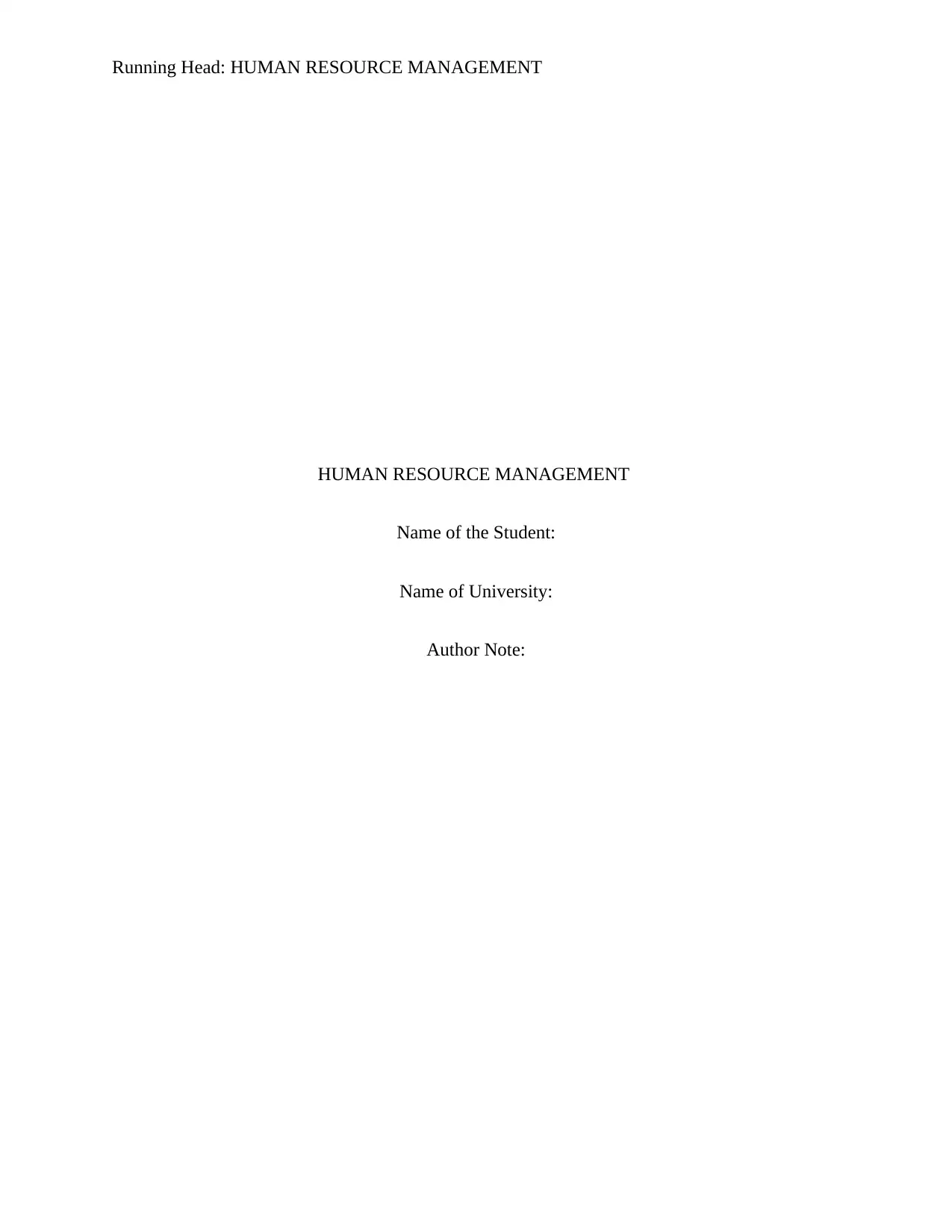
Running Head: HUMAN RESOURCE MANAGEMENT
HUMAN RESOURCE MANAGEMENT
Name of the Student:
Name of University:
Author Note:
HUMAN RESOURCE MANAGEMENT
Name of the Student:
Name of University:
Author Note:
Paraphrase This Document
Need a fresh take? Get an instant paraphrase of this document with our AI Paraphraser
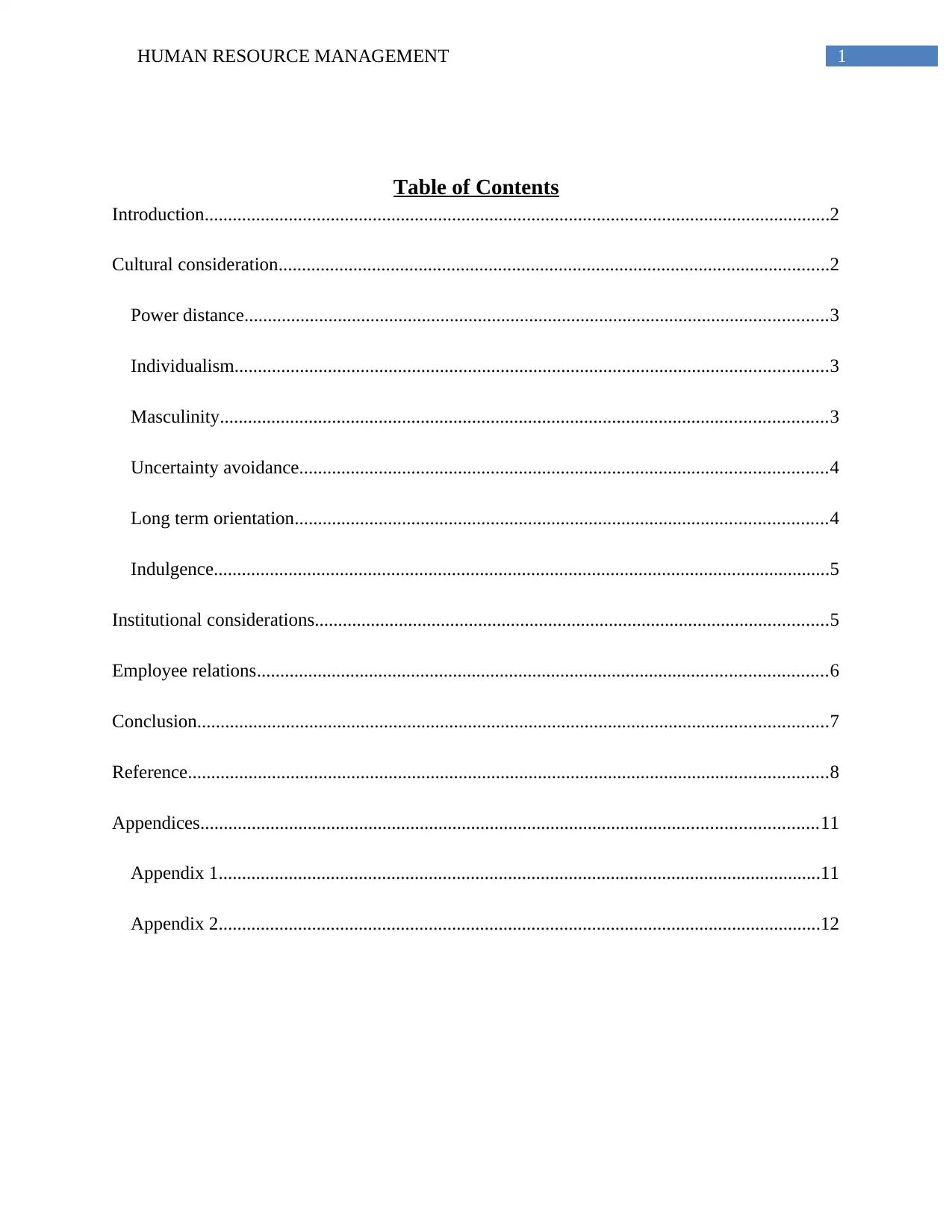
1HUMAN RESOURCE MANAGEMENT
Table of Contents
Introduction......................................................................................................................................2
Cultural consideration......................................................................................................................2
Power distance.............................................................................................................................3
Individualism...............................................................................................................................3
Masculinity..................................................................................................................................3
Uncertainty avoidance.................................................................................................................4
Long term orientation..................................................................................................................4
Indulgence....................................................................................................................................5
Institutional considerations..............................................................................................................5
Employee relations..........................................................................................................................6
Conclusion.......................................................................................................................................7
Reference.........................................................................................................................................8
Appendices....................................................................................................................................11
Appendix 1.................................................................................................................................11
Appendix 2.................................................................................................................................12
Table of Contents
Introduction......................................................................................................................................2
Cultural consideration......................................................................................................................2
Power distance.............................................................................................................................3
Individualism...............................................................................................................................3
Masculinity..................................................................................................................................3
Uncertainty avoidance.................................................................................................................4
Long term orientation..................................................................................................................4
Indulgence....................................................................................................................................5
Institutional considerations..............................................................................................................5
Employee relations..........................................................................................................................6
Conclusion.......................................................................................................................................7
Reference.........................................................................................................................................8
Appendices....................................................................................................................................11
Appendix 1.................................................................................................................................11
Appendix 2.................................................................................................................................12
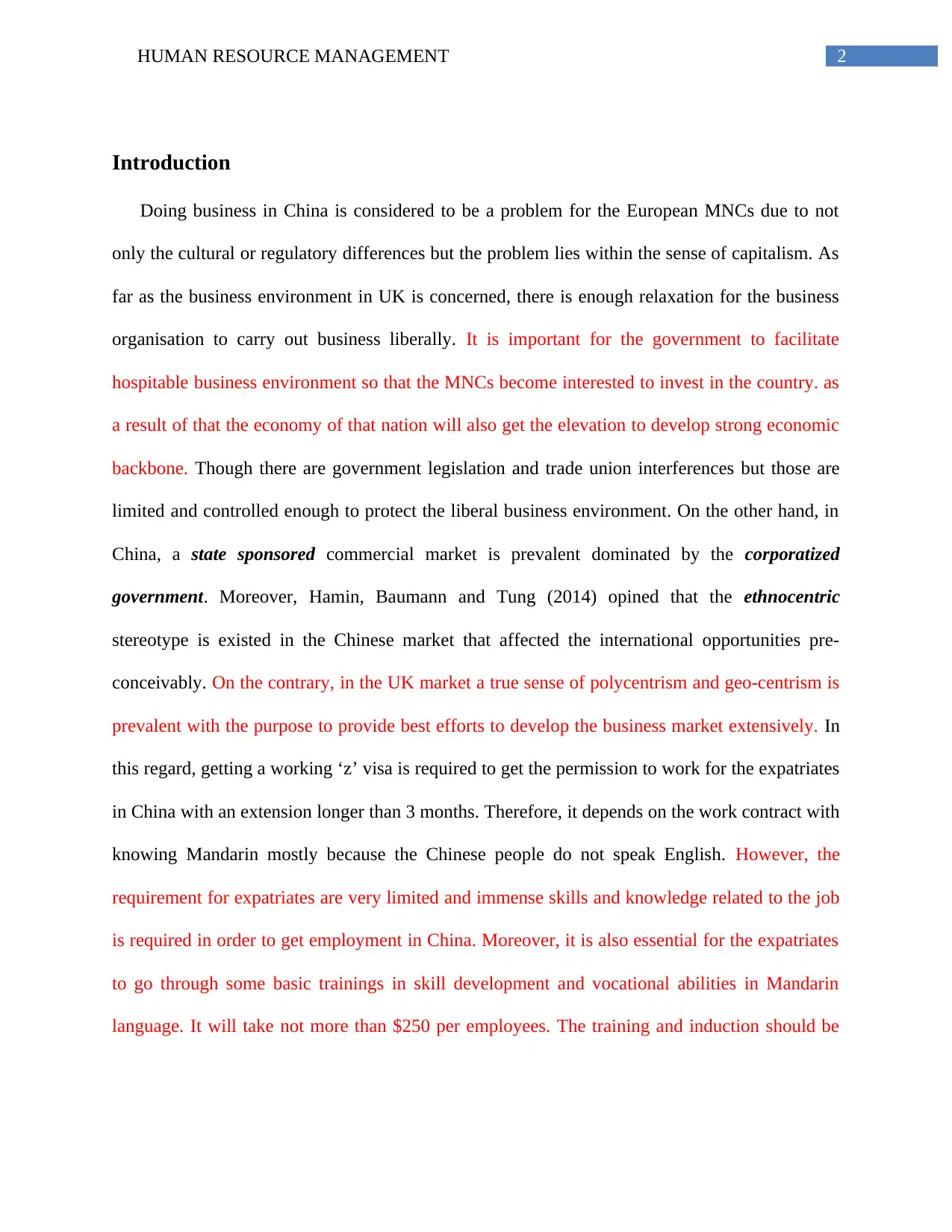
2HUMAN RESOURCE MANAGEMENT
Introduction
Doing business in China is considered to be a problem for the European MNCs due to not
only the cultural or regulatory differences but the problem lies within the sense of capitalism. As
far as the business environment in UK is concerned, there is enough relaxation for the business
organisation to carry out business liberally. It is important for the government to facilitate
hospitable business environment so that the MNCs become interested to invest in the country. as
a result of that the economy of that nation will also get the elevation to develop strong economic
backbone. Though there are government legislation and trade union interferences but those are
limited and controlled enough to protect the liberal business environment. On the other hand, in
China, a state sponsored commercial market is prevalent dominated by the corporatized
government. Moreover, Hamin, Baumann and Tung (2014) opined that the ethnocentric
stereotype is existed in the Chinese market that affected the international opportunities pre-
conceivably. On the contrary, in the UK market a true sense of polycentrism and geo-centrism is
prevalent with the purpose to provide best efforts to develop the business market extensively. In
this regard, getting a working ‘z’ visa is required to get the permission to work for the expatriates
in China with an extension longer than 3 months. Therefore, it depends on the work contract with
knowing Mandarin mostly because the Chinese people do not speak English. However, the
requirement for expatriates are very limited and immense skills and knowledge related to the job
is required in order to get employment in China. Moreover, it is also essential for the expatriates
to go through some basic trainings in skill development and vocational abilities in Mandarin
language. It will take not more than $250 per employees. The training and induction should be
Introduction
Doing business in China is considered to be a problem for the European MNCs due to not
only the cultural or regulatory differences but the problem lies within the sense of capitalism. As
far as the business environment in UK is concerned, there is enough relaxation for the business
organisation to carry out business liberally. It is important for the government to facilitate
hospitable business environment so that the MNCs become interested to invest in the country. as
a result of that the economy of that nation will also get the elevation to develop strong economic
backbone. Though there are government legislation and trade union interferences but those are
limited and controlled enough to protect the liberal business environment. On the other hand, in
China, a state sponsored commercial market is prevalent dominated by the corporatized
government. Moreover, Hamin, Baumann and Tung (2014) opined that the ethnocentric
stereotype is existed in the Chinese market that affected the international opportunities pre-
conceivably. On the contrary, in the UK market a true sense of polycentrism and geo-centrism is
prevalent with the purpose to provide best efforts to develop the business market extensively. In
this regard, getting a working ‘z’ visa is required to get the permission to work for the expatriates
in China with an extension longer than 3 months. Therefore, it depends on the work contract with
knowing Mandarin mostly because the Chinese people do not speak English. However, the
requirement for expatriates are very limited and immense skills and knowledge related to the job
is required in order to get employment in China. Moreover, it is also essential for the expatriates
to go through some basic trainings in skill development and vocational abilities in Mandarin
language. It will take not more than $250 per employees. The training and induction should be
⊘ This is a preview!⊘
Do you want full access?
Subscribe today to unlock all pages.

Trusted by 1+ million students worldwide
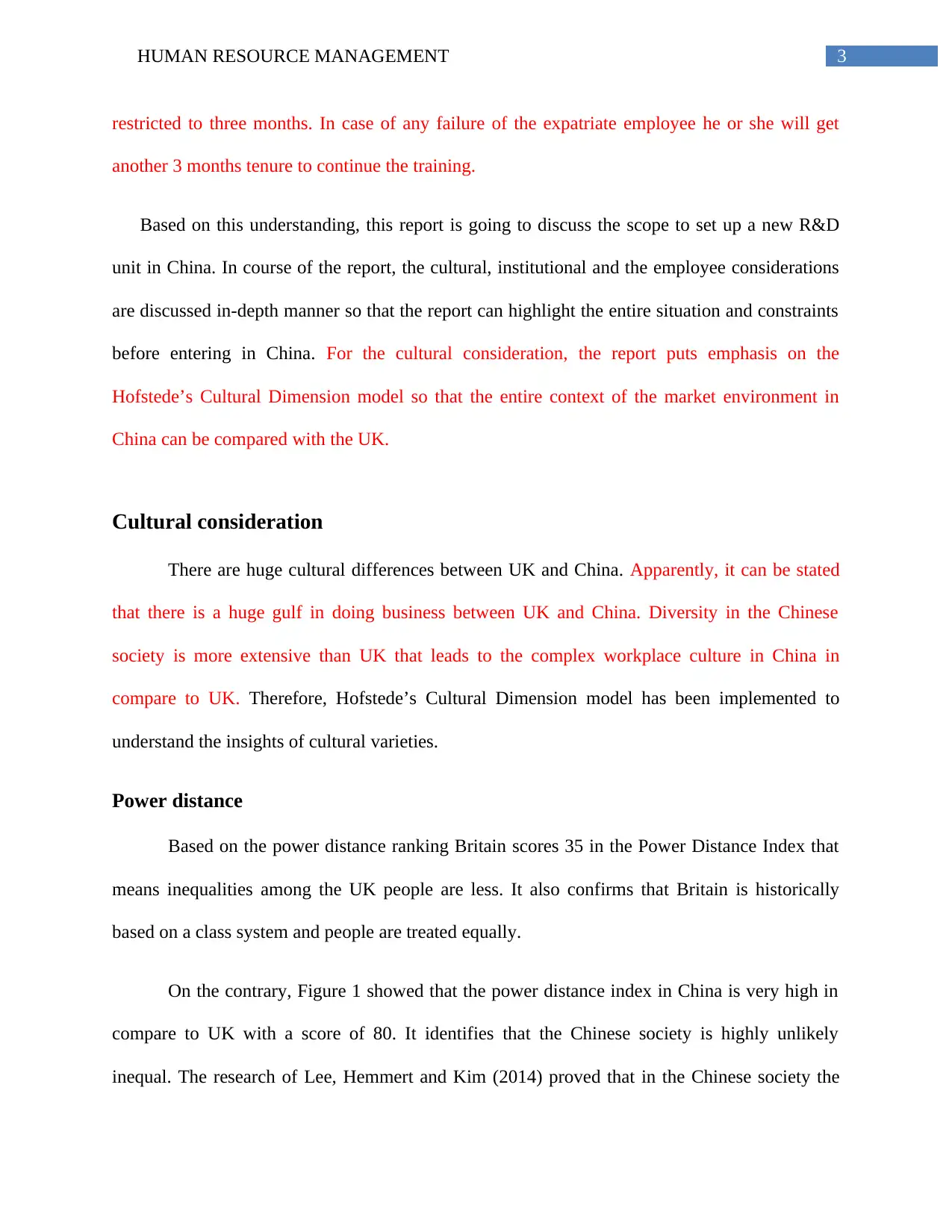
3HUMAN RESOURCE MANAGEMENT
restricted to three months. In case of any failure of the expatriate employee he or she will get
another 3 months tenure to continue the training.
Based on this understanding, this report is going to discuss the scope to set up a new R&D
unit in China. In course of the report, the cultural, institutional and the employee considerations
are discussed in-depth manner so that the report can highlight the entire situation and constraints
before entering in China. For the cultural consideration, the report puts emphasis on the
Hofstede’s Cultural Dimension model so that the entire context of the market environment in
China can be compared with the UK.
Cultural consideration
There are huge cultural differences between UK and China. Apparently, it can be stated
that there is a huge gulf in doing business between UK and China. Diversity in the Chinese
society is more extensive than UK that leads to the complex workplace culture in China in
compare to UK. Therefore, Hofstede’s Cultural Dimension model has been implemented to
understand the insights of cultural varieties.
Power distance
Based on the power distance ranking Britain scores 35 in the Power Distance Index that
means inequalities among the UK people are less. It also confirms that Britain is historically
based on a class system and people are treated equally.
On the contrary, Figure 1 showed that the power distance index in China is very high in
compare to UK with a score of 80. It identifies that the Chinese society is highly unlikely
inequal. The research of Lee, Hemmert and Kim (2014) proved that in the Chinese society the
restricted to three months. In case of any failure of the expatriate employee he or she will get
another 3 months tenure to continue the training.
Based on this understanding, this report is going to discuss the scope to set up a new R&D
unit in China. In course of the report, the cultural, institutional and the employee considerations
are discussed in-depth manner so that the report can highlight the entire situation and constraints
before entering in China. For the cultural consideration, the report puts emphasis on the
Hofstede’s Cultural Dimension model so that the entire context of the market environment in
China can be compared with the UK.
Cultural consideration
There are huge cultural differences between UK and China. Apparently, it can be stated
that there is a huge gulf in doing business between UK and China. Diversity in the Chinese
society is more extensive than UK that leads to the complex workplace culture in China in
compare to UK. Therefore, Hofstede’s Cultural Dimension model has been implemented to
understand the insights of cultural varieties.
Power distance
Based on the power distance ranking Britain scores 35 in the Power Distance Index that
means inequalities among the UK people are less. It also confirms that Britain is historically
based on a class system and people are treated equally.
On the contrary, Figure 1 showed that the power distance index in China is very high in
compare to UK with a score of 80. It identifies that the Chinese society is highly unlikely
inequal. The research of Lee, Hemmert and Kim (2014) proved that in the Chinese society the
Paraphrase This Document
Need a fresh take? Get an instant paraphrase of this document with our AI Paraphraser
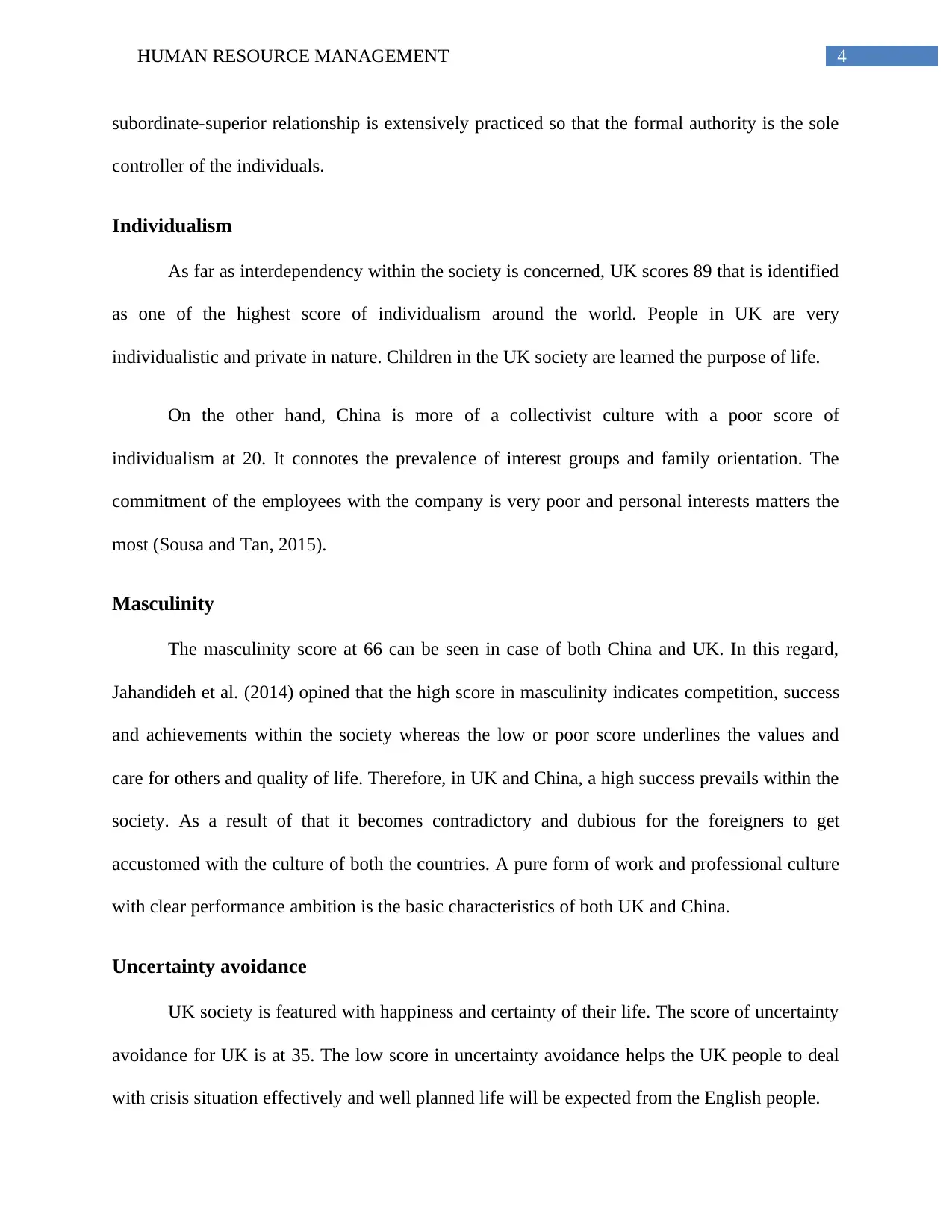
4HUMAN RESOURCE MANAGEMENT
subordinate-superior relationship is extensively practiced so that the formal authority is the sole
controller of the individuals.
Individualism
As far as interdependency within the society is concerned, UK scores 89 that is identified
as one of the highest score of individualism around the world. People in UK are very
individualistic and private in nature. Children in the UK society are learned the purpose of life.
On the other hand, China is more of a collectivist culture with a poor score of
individualism at 20. It connotes the prevalence of interest groups and family orientation. The
commitment of the employees with the company is very poor and personal interests matters the
most (Sousa and Tan, 2015).
Masculinity
The masculinity score at 66 can be seen in case of both China and UK. In this regard,
Jahandideh et al. (2014) opined that the high score in masculinity indicates competition, success
and achievements within the society whereas the low or poor score underlines the values and
care for others and quality of life. Therefore, in UK and China, a high success prevails within the
society. As a result of that it becomes contradictory and dubious for the foreigners to get
accustomed with the culture of both the countries. A pure form of work and professional culture
with clear performance ambition is the basic characteristics of both UK and China.
Uncertainty avoidance
UK society is featured with happiness and certainty of their life. The score of uncertainty
avoidance for UK is at 35. The low score in uncertainty avoidance helps the UK people to deal
with crisis situation effectively and well planned life will be expected from the English people.
subordinate-superior relationship is extensively practiced so that the formal authority is the sole
controller of the individuals.
Individualism
As far as interdependency within the society is concerned, UK scores 89 that is identified
as one of the highest score of individualism around the world. People in UK are very
individualistic and private in nature. Children in the UK society are learned the purpose of life.
On the other hand, China is more of a collectivist culture with a poor score of
individualism at 20. It connotes the prevalence of interest groups and family orientation. The
commitment of the employees with the company is very poor and personal interests matters the
most (Sousa and Tan, 2015).
Masculinity
The masculinity score at 66 can be seen in case of both China and UK. In this regard,
Jahandideh et al. (2014) opined that the high score in masculinity indicates competition, success
and achievements within the society whereas the low or poor score underlines the values and
care for others and quality of life. Therefore, in UK and China, a high success prevails within the
society. As a result of that it becomes contradictory and dubious for the foreigners to get
accustomed with the culture of both the countries. A pure form of work and professional culture
with clear performance ambition is the basic characteristics of both UK and China.
Uncertainty avoidance
UK society is featured with happiness and certainty of their life. The score of uncertainty
avoidance for UK is at 35. The low score in uncertainty avoidance helps the UK people to deal
with crisis situation effectively and well planned life will be expected from the English people.
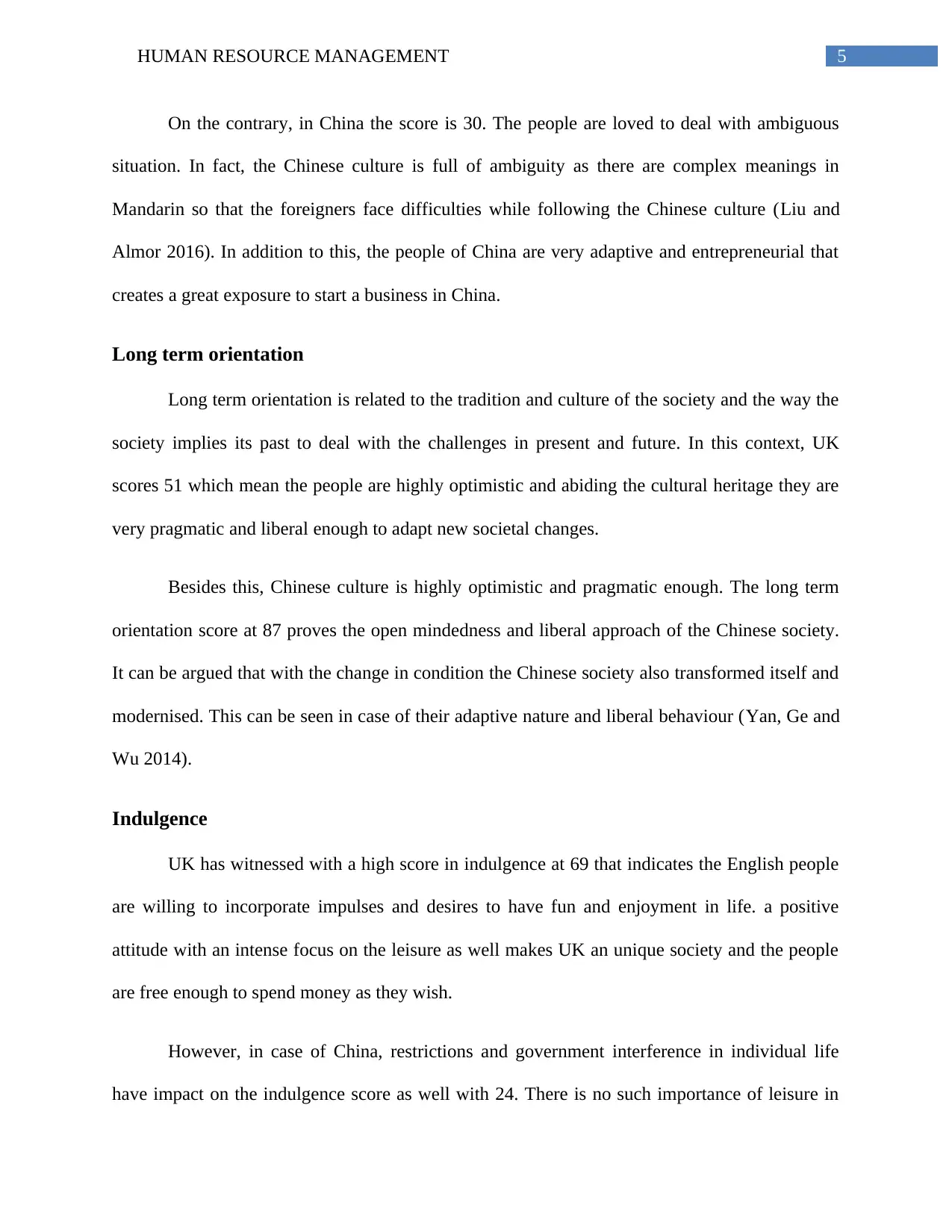
5HUMAN RESOURCE MANAGEMENT
On the contrary, in China the score is 30. The people are loved to deal with ambiguous
situation. In fact, the Chinese culture is full of ambiguity as there are complex meanings in
Mandarin so that the foreigners face difficulties while following the Chinese culture (Liu and
Almor 2016). In addition to this, the people of China are very adaptive and entrepreneurial that
creates a great exposure to start a business in China.
Long term orientation
Long term orientation is related to the tradition and culture of the society and the way the
society implies its past to deal with the challenges in present and future. In this context, UK
scores 51 which mean the people are highly optimistic and abiding the cultural heritage they are
very pragmatic and liberal enough to adapt new societal changes.
Besides this, Chinese culture is highly optimistic and pragmatic enough. The long term
orientation score at 87 proves the open mindedness and liberal approach of the Chinese society.
It can be argued that with the change in condition the Chinese society also transformed itself and
modernised. This can be seen in case of their adaptive nature and liberal behaviour (Yan, Ge and
Wu 2014).
Indulgence
UK has witnessed with a high score in indulgence at 69 that indicates the English people
are willing to incorporate impulses and desires to have fun and enjoyment in life. a positive
attitude with an intense focus on the leisure as well makes UK an unique society and the people
are free enough to spend money as they wish.
However, in case of China, restrictions and government interference in individual life
have impact on the indulgence score as well with 24. There is no such importance of leisure in
On the contrary, in China the score is 30. The people are loved to deal with ambiguous
situation. In fact, the Chinese culture is full of ambiguity as there are complex meanings in
Mandarin so that the foreigners face difficulties while following the Chinese culture (Liu and
Almor 2016). In addition to this, the people of China are very adaptive and entrepreneurial that
creates a great exposure to start a business in China.
Long term orientation
Long term orientation is related to the tradition and culture of the society and the way the
society implies its past to deal with the challenges in present and future. In this context, UK
scores 51 which mean the people are highly optimistic and abiding the cultural heritage they are
very pragmatic and liberal enough to adapt new societal changes.
Besides this, Chinese culture is highly optimistic and pragmatic enough. The long term
orientation score at 87 proves the open mindedness and liberal approach of the Chinese society.
It can be argued that with the change in condition the Chinese society also transformed itself and
modernised. This can be seen in case of their adaptive nature and liberal behaviour (Yan, Ge and
Wu 2014).
Indulgence
UK has witnessed with a high score in indulgence at 69 that indicates the English people
are willing to incorporate impulses and desires to have fun and enjoyment in life. a positive
attitude with an intense focus on the leisure as well makes UK an unique society and the people
are free enough to spend money as they wish.
However, in case of China, restrictions and government interference in individual life
have impact on the indulgence score as well with 24. There is no such importance of leisure in
⊘ This is a preview!⊘
Do you want full access?
Subscribe today to unlock all pages.

Trusted by 1+ million students worldwide
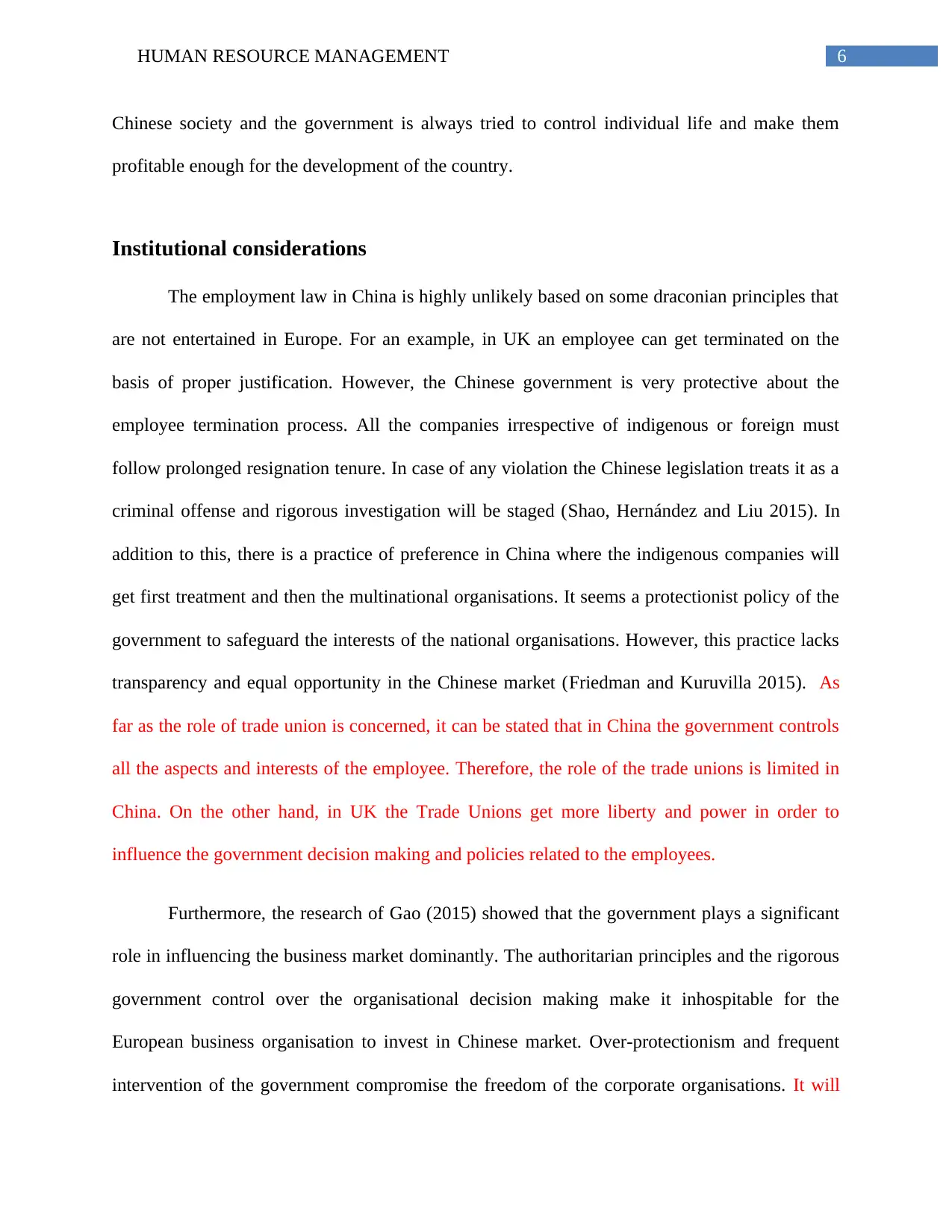
6HUMAN RESOURCE MANAGEMENT
Chinese society and the government is always tried to control individual life and make them
profitable enough for the development of the country.
Institutional considerations
The employment law in China is highly unlikely based on some draconian principles that
are not entertained in Europe. For an example, in UK an employee can get terminated on the
basis of proper justification. However, the Chinese government is very protective about the
employee termination process. All the companies irrespective of indigenous or foreign must
follow prolonged resignation tenure. In case of any violation the Chinese legislation treats it as a
criminal offense and rigorous investigation will be staged (Shao, Hernández and Liu 2015). In
addition to this, there is a practice of preference in China where the indigenous companies will
get first treatment and then the multinational organisations. It seems a protectionist policy of the
government to safeguard the interests of the national organisations. However, this practice lacks
transparency and equal opportunity in the Chinese market (Friedman and Kuruvilla 2015). As
far as the role of trade union is concerned, it can be stated that in China the government controls
all the aspects and interests of the employee. Therefore, the role of the trade unions is limited in
China. On the other hand, in UK the Trade Unions get more liberty and power in order to
influence the government decision making and policies related to the employees.
Furthermore, the research of Gao (2015) showed that the government plays a significant
role in influencing the business market dominantly. The authoritarian principles and the rigorous
government control over the organisational decision making make it inhospitable for the
European business organisation to invest in Chinese market. Over-protectionism and frequent
intervention of the government compromise the freedom of the corporate organisations. It will
Chinese society and the government is always tried to control individual life and make them
profitable enough for the development of the country.
Institutional considerations
The employment law in China is highly unlikely based on some draconian principles that
are not entertained in Europe. For an example, in UK an employee can get terminated on the
basis of proper justification. However, the Chinese government is very protective about the
employee termination process. All the companies irrespective of indigenous or foreign must
follow prolonged resignation tenure. In case of any violation the Chinese legislation treats it as a
criminal offense and rigorous investigation will be staged (Shao, Hernández and Liu 2015). In
addition to this, there is a practice of preference in China where the indigenous companies will
get first treatment and then the multinational organisations. It seems a protectionist policy of the
government to safeguard the interests of the national organisations. However, this practice lacks
transparency and equal opportunity in the Chinese market (Friedman and Kuruvilla 2015). As
far as the role of trade union is concerned, it can be stated that in China the government controls
all the aspects and interests of the employee. Therefore, the role of the trade unions is limited in
China. On the other hand, in UK the Trade Unions get more liberty and power in order to
influence the government decision making and policies related to the employees.
Furthermore, the research of Gao (2015) showed that the government plays a significant
role in influencing the business market dominantly. The authoritarian principles and the rigorous
government control over the organisational decision making make it inhospitable for the
European business organisation to invest in Chinese market. Over-protectionism and frequent
intervention of the government compromise the freedom of the corporate organisations. It will
Paraphrase This Document
Need a fresh take? Get an instant paraphrase of this document with our AI Paraphraser
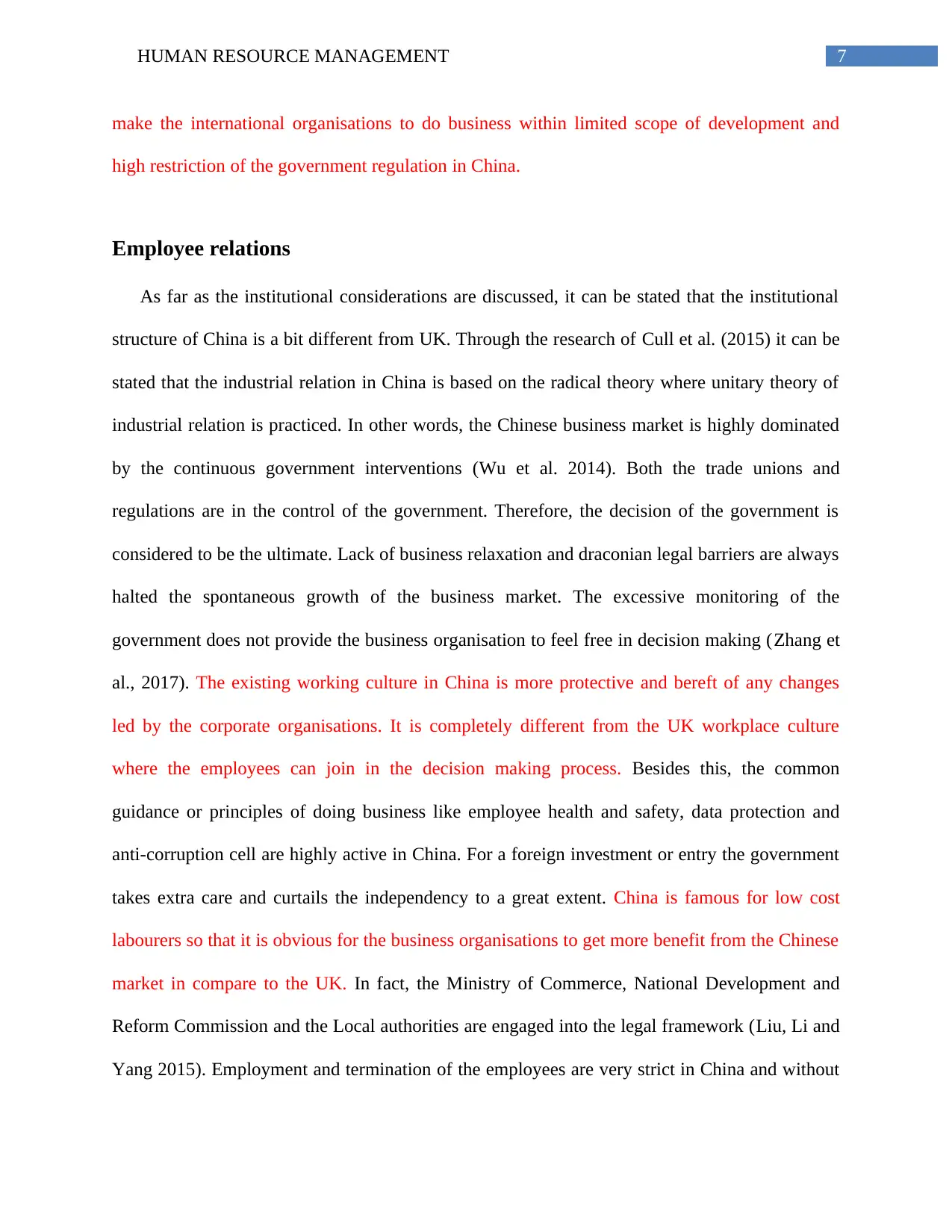
7HUMAN RESOURCE MANAGEMENT
make the international organisations to do business within limited scope of development and
high restriction of the government regulation in China.
Employee relations
As far as the institutional considerations are discussed, it can be stated that the institutional
structure of China is a bit different from UK. Through the research of Cull et al. (2015) it can be
stated that the industrial relation in China is based on the radical theory where unitary theory of
industrial relation is practiced. In other words, the Chinese business market is highly dominated
by the continuous government interventions (Wu et al. 2014). Both the trade unions and
regulations are in the control of the government. Therefore, the decision of the government is
considered to be the ultimate. Lack of business relaxation and draconian legal barriers are always
halted the spontaneous growth of the business market. The excessive monitoring of the
government does not provide the business organisation to feel free in decision making (Zhang et
al., 2017). The existing working culture in China is more protective and bereft of any changes
led by the corporate organisations. It is completely different from the UK workplace culture
where the employees can join in the decision making process. Besides this, the common
guidance or principles of doing business like employee health and safety, data protection and
anti-corruption cell are highly active in China. For a foreign investment or entry the government
takes extra care and curtails the independency to a great extent. China is famous for low cost
labourers so that it is obvious for the business organisations to get more benefit from the Chinese
market in compare to the UK. In fact, the Ministry of Commerce, National Development and
Reform Commission and the Local authorities are engaged into the legal framework (Liu, Li and
Yang 2015). Employment and termination of the employees are very strict in China and without
make the international organisations to do business within limited scope of development and
high restriction of the government regulation in China.
Employee relations
As far as the institutional considerations are discussed, it can be stated that the institutional
structure of China is a bit different from UK. Through the research of Cull et al. (2015) it can be
stated that the industrial relation in China is based on the radical theory where unitary theory of
industrial relation is practiced. In other words, the Chinese business market is highly dominated
by the continuous government interventions (Wu et al. 2014). Both the trade unions and
regulations are in the control of the government. Therefore, the decision of the government is
considered to be the ultimate. Lack of business relaxation and draconian legal barriers are always
halted the spontaneous growth of the business market. The excessive monitoring of the
government does not provide the business organisation to feel free in decision making (Zhang et
al., 2017). The existing working culture in China is more protective and bereft of any changes
led by the corporate organisations. It is completely different from the UK workplace culture
where the employees can join in the decision making process. Besides this, the common
guidance or principles of doing business like employee health and safety, data protection and
anti-corruption cell are highly active in China. For a foreign investment or entry the government
takes extra care and curtails the independency to a great extent. China is famous for low cost
labourers so that it is obvious for the business organisations to get more benefit from the Chinese
market in compare to the UK. In fact, the Ministry of Commerce, National Development and
Reform Commission and the Local authorities are engaged into the legal framework (Liu, Li and
Yang 2015). Employment and termination of the employees are very strict in China and without
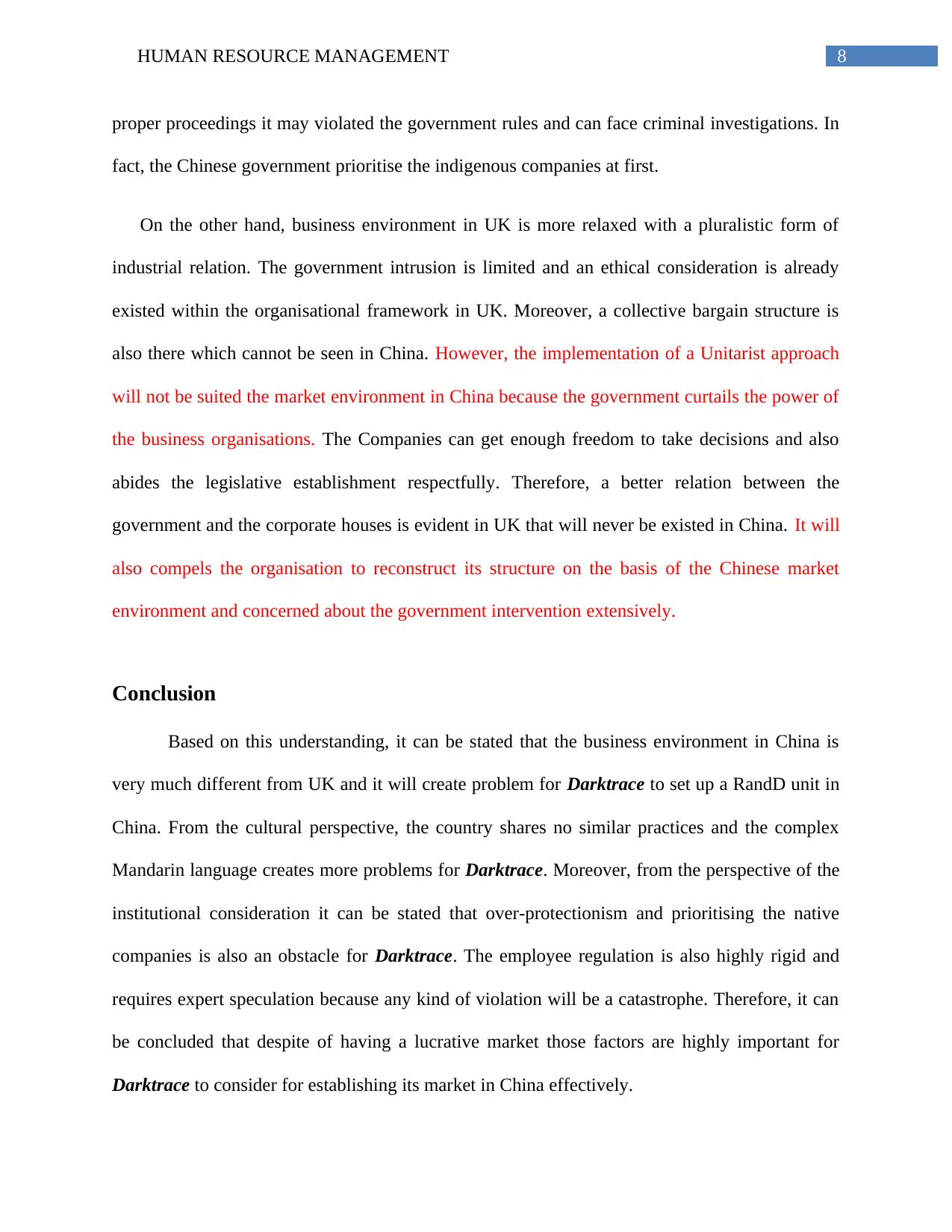
8HUMAN RESOURCE MANAGEMENT
proper proceedings it may violated the government rules and can face criminal investigations. In
fact, the Chinese government prioritise the indigenous companies at first.
On the other hand, business environment in UK is more relaxed with a pluralistic form of
industrial relation. The government intrusion is limited and an ethical consideration is already
existed within the organisational framework in UK. Moreover, a collective bargain structure is
also there which cannot be seen in China. However, the implementation of a Unitarist approach
will not be suited the market environment in China because the government curtails the power of
the business organisations. The Companies can get enough freedom to take decisions and also
abides the legislative establishment respectfully. Therefore, a better relation between the
government and the corporate houses is evident in UK that will never be existed in China. It will
also compels the organisation to reconstruct its structure on the basis of the Chinese market
environment and concerned about the government intervention extensively.
Conclusion
Based on this understanding, it can be stated that the business environment in China is
very much different from UK and it will create problem for Darktrace to set up a RandD unit in
China. From the cultural perspective, the country shares no similar practices and the complex
Mandarin language creates more problems for Darktrace. Moreover, from the perspective of the
institutional consideration it can be stated that over-protectionism and prioritising the native
companies is also an obstacle for Darktrace. The employee regulation is also highly rigid and
requires expert speculation because any kind of violation will be a catastrophe. Therefore, it can
be concluded that despite of having a lucrative market those factors are highly important for
Darktrace to consider for establishing its market in China effectively.
proper proceedings it may violated the government rules and can face criminal investigations. In
fact, the Chinese government prioritise the indigenous companies at first.
On the other hand, business environment in UK is more relaxed with a pluralistic form of
industrial relation. The government intrusion is limited and an ethical consideration is already
existed within the organisational framework in UK. Moreover, a collective bargain structure is
also there which cannot be seen in China. However, the implementation of a Unitarist approach
will not be suited the market environment in China because the government curtails the power of
the business organisations. The Companies can get enough freedom to take decisions and also
abides the legislative establishment respectfully. Therefore, a better relation between the
government and the corporate houses is evident in UK that will never be existed in China. It will
also compels the organisation to reconstruct its structure on the basis of the Chinese market
environment and concerned about the government intervention extensively.
Conclusion
Based on this understanding, it can be stated that the business environment in China is
very much different from UK and it will create problem for Darktrace to set up a RandD unit in
China. From the cultural perspective, the country shares no similar practices and the complex
Mandarin language creates more problems for Darktrace. Moreover, from the perspective of the
institutional consideration it can be stated that over-protectionism and prioritising the native
companies is also an obstacle for Darktrace. The employee regulation is also highly rigid and
requires expert speculation because any kind of violation will be a catastrophe. Therefore, it can
be concluded that despite of having a lucrative market those factors are highly important for
Darktrace to consider for establishing its market in China effectively.
⊘ This is a preview!⊘
Do you want full access?
Subscribe today to unlock all pages.

Trusted by 1+ million students worldwide
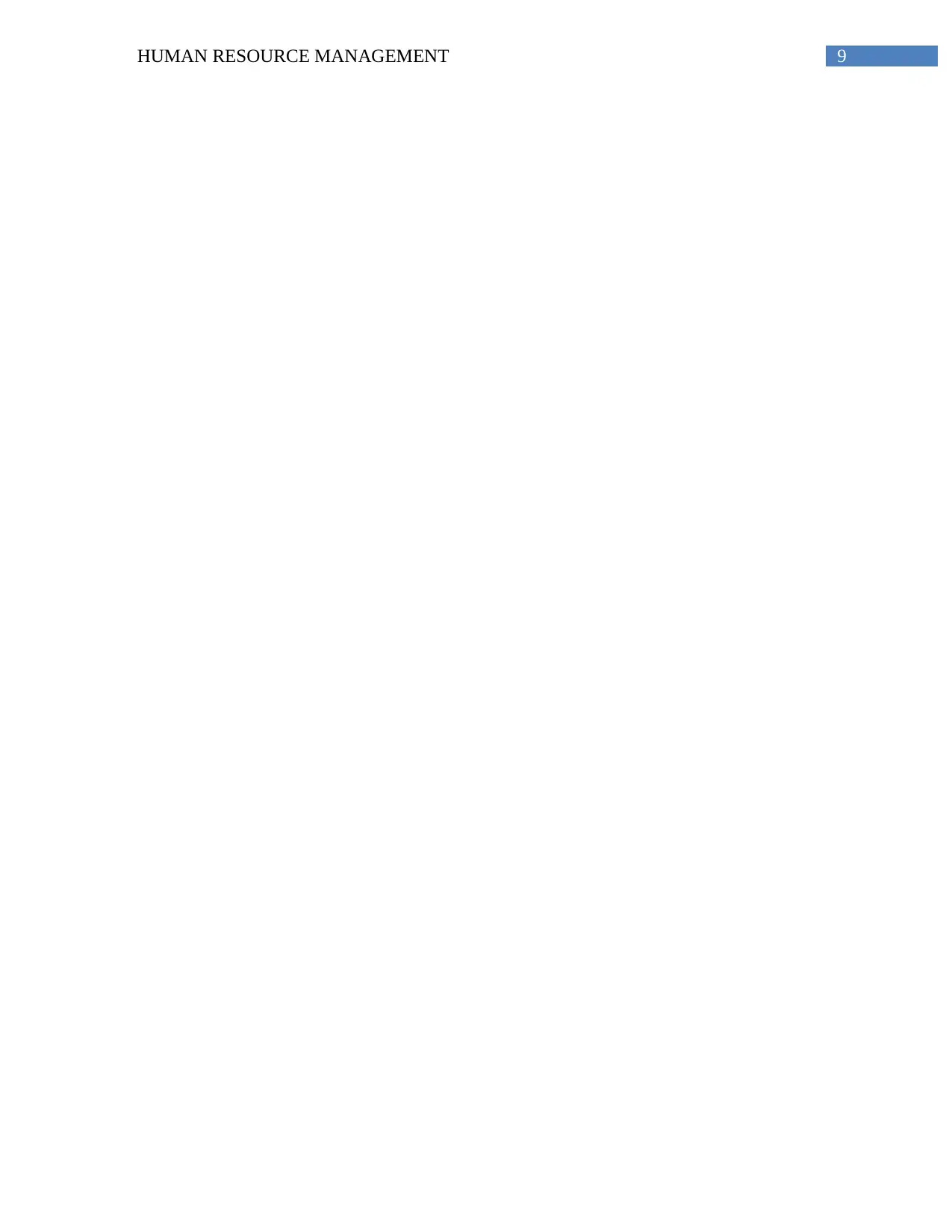
9HUMAN RESOURCE MANAGEMENT
Paraphrase This Document
Need a fresh take? Get an instant paraphrase of this document with our AI Paraphraser
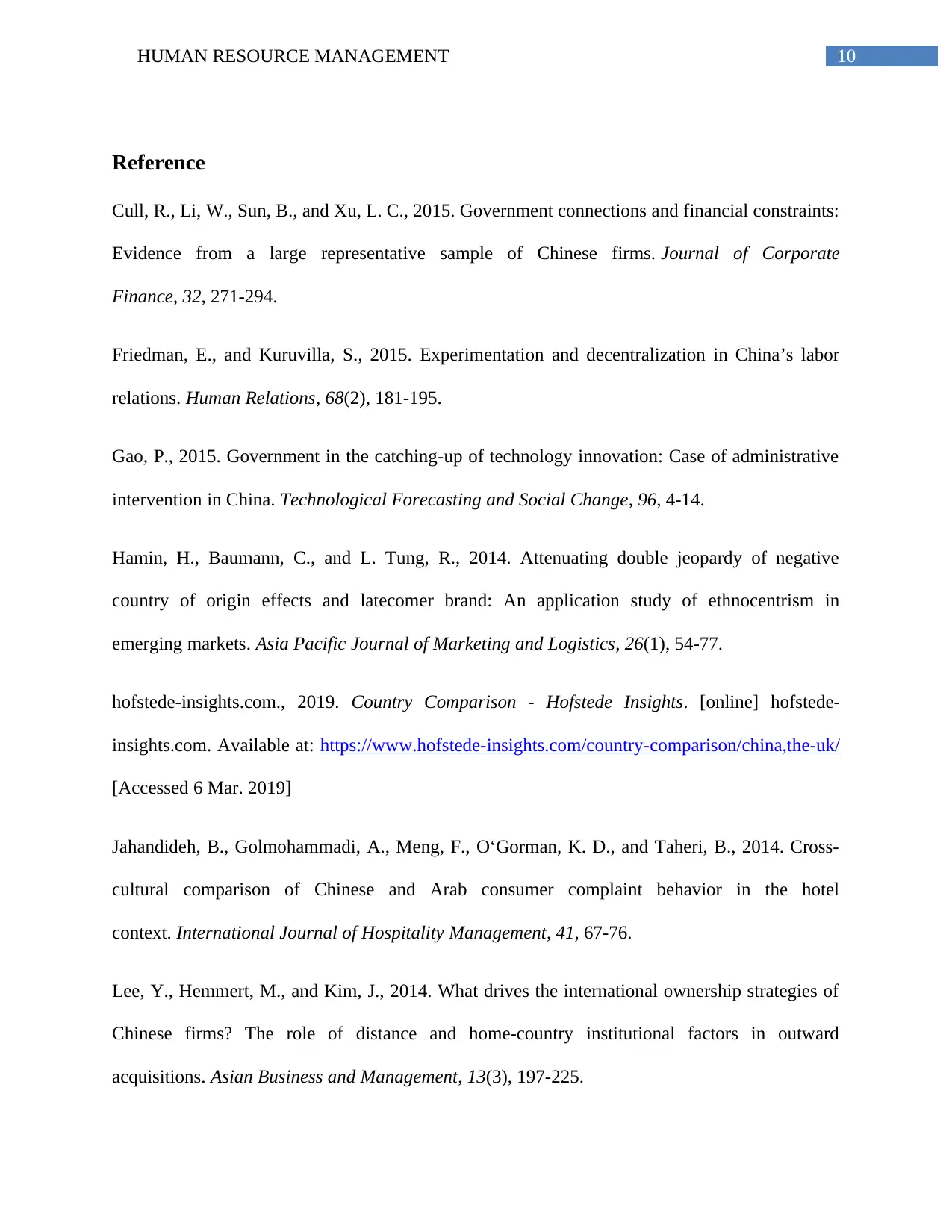
10HUMAN RESOURCE MANAGEMENT
Reference
Cull, R., Li, W., Sun, B., and Xu, L. C., 2015. Government connections and financial constraints:
Evidence from a large representative sample of Chinese firms. Journal of Corporate
Finance, 32, 271-294.
Friedman, E., and Kuruvilla, S., 2015. Experimentation and decentralization in China’s labor
relations. Human Relations, 68(2), 181-195.
Gao, P., 2015. Government in the catching-up of technology innovation: Case of administrative
intervention in China. Technological Forecasting and Social Change, 96, 4-14.
Hamin, H., Baumann, C., and L. Tung, R., 2014. Attenuating double jeopardy of negative
country of origin effects and latecomer brand: An application study of ethnocentrism in
emerging markets. Asia Pacific Journal of Marketing and Logistics, 26(1), 54-77.
hofstede-insights.com., 2019. Country Comparison - Hofstede Insights. [online] hofstede-
insights.com. Available at: https://www.hofstede-insights.com/country-comparison/china,the-uk/
[Accessed 6 Mar. 2019]
Jahandideh, B., Golmohammadi, A., Meng, F., O‘Gorman, K. D., and Taheri, B., 2014. Cross-
cultural comparison of Chinese and Arab consumer complaint behavior in the hotel
context. International Journal of Hospitality Management, 41, 67-76.
Lee, Y., Hemmert, M., and Kim, J., 2014. What drives the international ownership strategies of
Chinese firms? The role of distance and home-country institutional factors in outward
acquisitions. Asian Business and Management, 13(3), 197-225.
Reference
Cull, R., Li, W., Sun, B., and Xu, L. C., 2015. Government connections and financial constraints:
Evidence from a large representative sample of Chinese firms. Journal of Corporate
Finance, 32, 271-294.
Friedman, E., and Kuruvilla, S., 2015. Experimentation and decentralization in China’s labor
relations. Human Relations, 68(2), 181-195.
Gao, P., 2015. Government in the catching-up of technology innovation: Case of administrative
intervention in China. Technological Forecasting and Social Change, 96, 4-14.
Hamin, H., Baumann, C., and L. Tung, R., 2014. Attenuating double jeopardy of negative
country of origin effects and latecomer brand: An application study of ethnocentrism in
emerging markets. Asia Pacific Journal of Marketing and Logistics, 26(1), 54-77.
hofstede-insights.com., 2019. Country Comparison - Hofstede Insights. [online] hofstede-
insights.com. Available at: https://www.hofstede-insights.com/country-comparison/china,the-uk/
[Accessed 6 Mar. 2019]
Jahandideh, B., Golmohammadi, A., Meng, F., O‘Gorman, K. D., and Taheri, B., 2014. Cross-
cultural comparison of Chinese and Arab consumer complaint behavior in the hotel
context. International Journal of Hospitality Management, 41, 67-76.
Lee, Y., Hemmert, M., and Kim, J., 2014. What drives the international ownership strategies of
Chinese firms? The role of distance and home-country institutional factors in outward
acquisitions. Asian Business and Management, 13(3), 197-225.
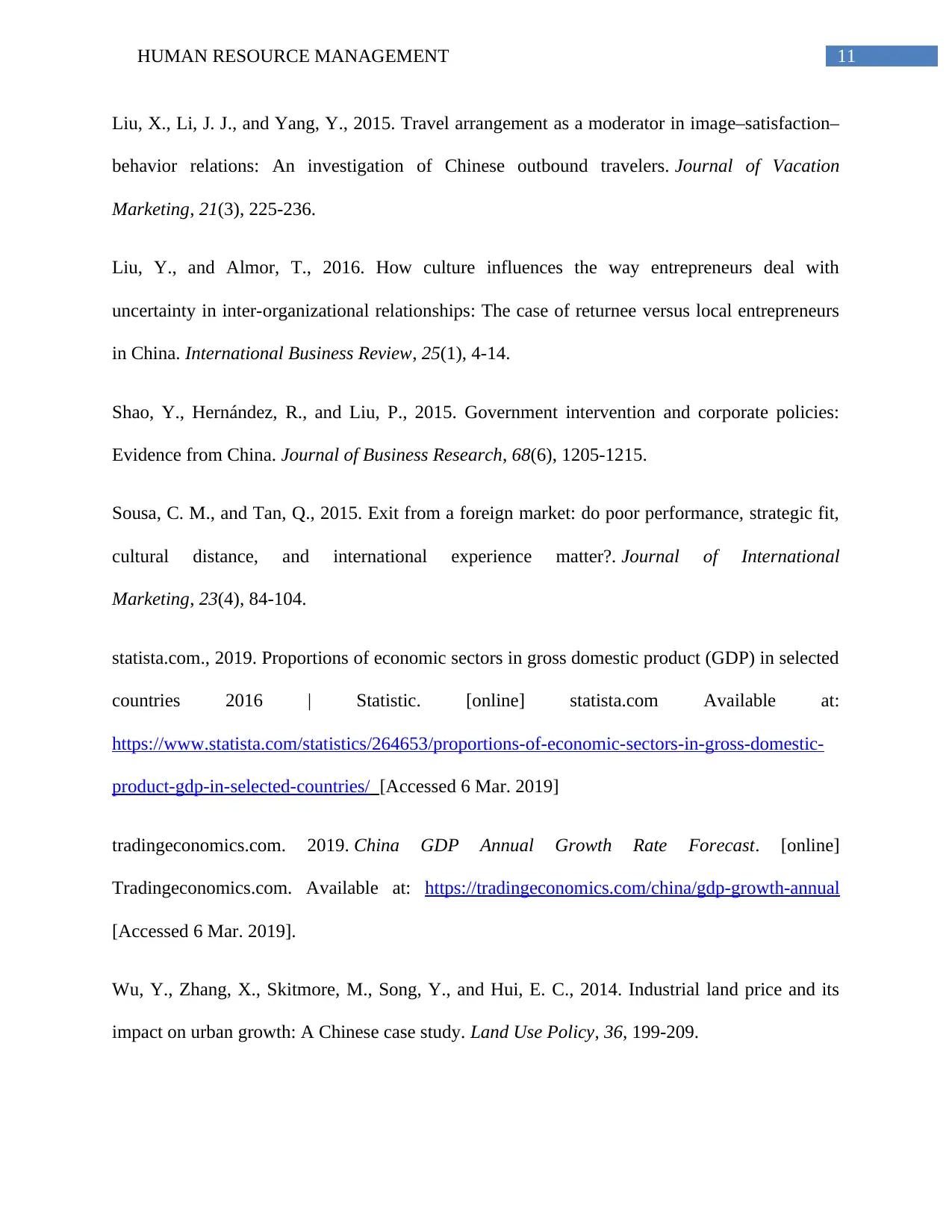
11HUMAN RESOURCE MANAGEMENT
Liu, X., Li, J. J., and Yang, Y., 2015. Travel arrangement as a moderator in image–satisfaction–
behavior relations: An investigation of Chinese outbound travelers. Journal of Vacation
Marketing, 21(3), 225-236.
Liu, Y., and Almor, T., 2016. How culture influences the way entrepreneurs deal with
uncertainty in inter-organizational relationships: The case of returnee versus local entrepreneurs
in China. International Business Review, 25(1), 4-14.
Shao, Y., Hernández, R., and Liu, P., 2015. Government intervention and corporate policies:
Evidence from China. Journal of Business Research, 68(6), 1205-1215.
Sousa, C. M., and Tan, Q., 2015. Exit from a foreign market: do poor performance, strategic fit,
cultural distance, and international experience matter?. Journal of International
Marketing, 23(4), 84-104.
statista.com., 2019. Proportions of economic sectors in gross domestic product (GDP) in selected
countries 2016 | Statistic. [online] statista.com Available at:
https://www.statista.com/statistics/264653/proportions-of-economic-sectors-in-gross-domestic-
product-gdp-in-selected-countries/ [Accessed 6 Mar. 2019]
tradingeconomics.com. 2019. China GDP Annual Growth Rate Forecast. [online]
Tradingeconomics.com. Available at: https://tradingeconomics.com/china/gdp-growth-annual
[Accessed 6 Mar. 2019].
Wu, Y., Zhang, X., Skitmore, M., Song, Y., and Hui, E. C., 2014. Industrial land price and its
impact on urban growth: A Chinese case study. Land Use Policy, 36, 199-209.
Liu, X., Li, J. J., and Yang, Y., 2015. Travel arrangement as a moderator in image–satisfaction–
behavior relations: An investigation of Chinese outbound travelers. Journal of Vacation
Marketing, 21(3), 225-236.
Liu, Y., and Almor, T., 2016. How culture influences the way entrepreneurs deal with
uncertainty in inter-organizational relationships: The case of returnee versus local entrepreneurs
in China. International Business Review, 25(1), 4-14.
Shao, Y., Hernández, R., and Liu, P., 2015. Government intervention and corporate policies:
Evidence from China. Journal of Business Research, 68(6), 1205-1215.
Sousa, C. M., and Tan, Q., 2015. Exit from a foreign market: do poor performance, strategic fit,
cultural distance, and international experience matter?. Journal of International
Marketing, 23(4), 84-104.
statista.com., 2019. Proportions of economic sectors in gross domestic product (GDP) in selected
countries 2016 | Statistic. [online] statista.com Available at:
https://www.statista.com/statistics/264653/proportions-of-economic-sectors-in-gross-domestic-
product-gdp-in-selected-countries/ [Accessed 6 Mar. 2019]
tradingeconomics.com. 2019. China GDP Annual Growth Rate Forecast. [online]
Tradingeconomics.com. Available at: https://tradingeconomics.com/china/gdp-growth-annual
[Accessed 6 Mar. 2019].
Wu, Y., Zhang, X., Skitmore, M., Song, Y., and Hui, E. C., 2014. Industrial land price and its
impact on urban growth: A Chinese case study. Land Use Policy, 36, 199-209.
⊘ This is a preview!⊘
Do you want full access?
Subscribe today to unlock all pages.

Trusted by 1+ million students worldwide
1 out of 15
Related Documents
Your All-in-One AI-Powered Toolkit for Academic Success.
+13062052269
info@desklib.com
Available 24*7 on WhatsApp / Email
![[object Object]](/_next/static/media/star-bottom.7253800d.svg)
Unlock your academic potential
Copyright © 2020–2026 A2Z Services. All Rights Reserved. Developed and managed by ZUCOL.




